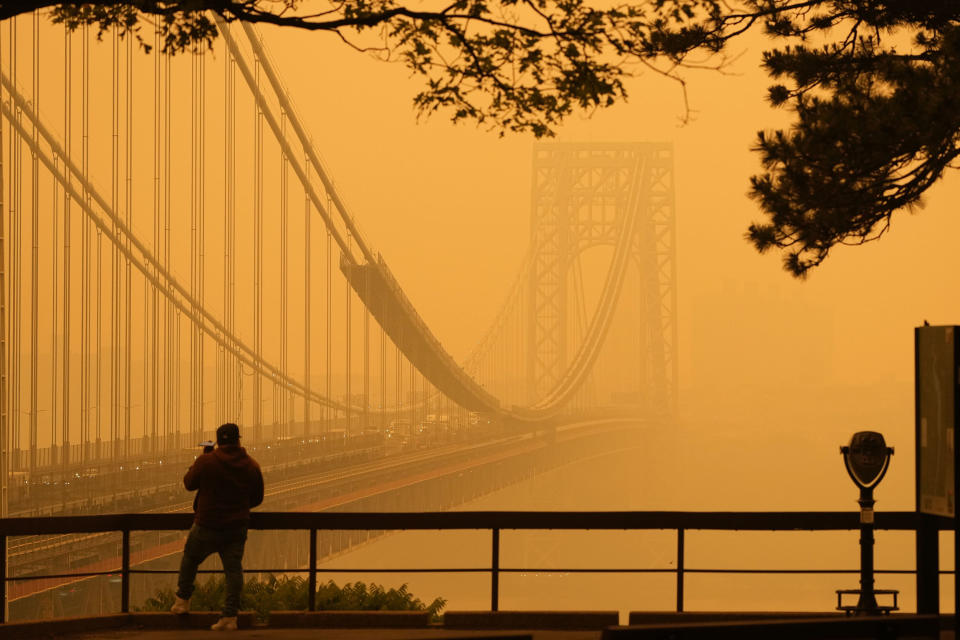Al Roker shares video from plane as he faces delays due to smoke conditions: ‘Yikes!’
- Oops!Something went wrong.Please try again later.
TODAY's Al Roker is facing some of the complications created by the wildfire smoke from Canada currently sweeping the United States, causing spots like New York City to have a thick haze.
As the smoke causes flight delays in the New York area, Al recorded a video of the view out his airplane window showing a yellowish tint to the sky as he waits in line to take off at LaGuardia Airport.
"It is so hazy that I'm waiting to take off on a flight to Washington, D.C.," he says. "They are stretching out the landings and takeoffs and we're still delayed and fifteenth for takeoff all because of the smoke that's out there."
Al adds, "Yikes!" as the video zooms into the window.
On June 7, the Federal Aviation Administration announced that the agency "slowed traffic to and from New York City area airports due to reduced visibility from wildfire smoke."
The FAA noted that the volume of traffic will continue to be adjusted, citing "rapidly changing conditions."
The FAA has slowed traffic to and from New York City area airports due to reduced visibility from wildfire smoke.
The agency will continue to adjust the volume of traffic to account for the rapidly changing conditions.
Please monitor https://t.co/smgdqJN3td. #AirQualityAlert— The FAA ✈️ (@FAANews) June 7, 2023
Air quality advisories were impacting up to 100 million people in the United States, specifically in the Northeast, Midwest and South, on Tuesday, according to NBC News.
Areas in the Northeast are experiencing poor air quality due to wildfire smoke from eastern Canada, where Nova Scotia and Quebec have been ablaze. Major cities like New York City, Philadelphia and Boston have since been engulfed in a smoky haze.

In states like Texas and Illinois, as well as other areas across the Midwest and South, air quality concerns are stemming from ground-level ozone or smog, NBC News reported.
Dr. Ronald Crystal, a pulmonologist and the chair of genetic medicine at Weill Cornell Medicine, spoke to TODAY.com, explaining the impacts the smoke can have on the lungs.
“When we inhale, the particles (from smoke) stimulate our airways to become inflamed to not function normally,” Crystal said.
For healthy people, he noted that the current poor air quality shouldn't pose too much of a concern in the short term, other than irritation.
“You may cough a bit or feel a little tickle in your throat ... but it’s not a permanent problem,” Crystal said, adding that any symptoms should resolve as air quality improves.
Groups who are more at risk amid the smoke include those with preexisting lung disease, like particularly asthma, chronic obstructive pulmonary disease, as well as people with post-COVID-19 respiratory issues.
The particles in the smoky air can stimulate the airways to constrict, he said. “These individuals already have a problem of constricted airways — for example, patients with asthma wheeze — so the inhalation of the particles can exacerbate the problem.”
As of Tuesday, the smoke from the Canadian wildfires shouldn't last long, according to Crystal, causing any negative health impacts to likely be short-lived.
“I don’t think people should worry about long-term effects because it’ll go away, particularly after rains, and a lot of the pollution will disappear,” he said.
Though it remains unknown how many more days the air quality alerts will be in effect, Crystal said rain should improve conditions in the Northeast "in the next few days."
This article was originally published on TODAY.com

